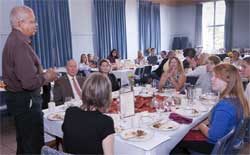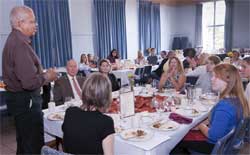 URI Diversity Week meal feeds soul too
URI Diversity Week meal feeds soul too
KINGSTON, R.I. – October 7, 2011 – Moroccan spiced red lentil soup, Caribbean jerk chicken, Indian pudding, Mesclun greens with native cranberries and goat cheese, and apple crisp were among the delectable offerings at the Diversity Week Luncheon Wednesday in the Memorial Union.
All of the foods awakened taste buds and pleased palates, but one other ingredient provided food for the soul, stories about food and its power to stimulate connection in families, among friends and even among strangers.
Students, faculty and staff gathered for “Sharing Food: Stories of Family, Culture and Connection,” to enjoy great food and to hear from each other how food influenced and still influences their lives. Sponsored by the College of Human Science and Services, the event featured Linda Sebelia, an adjunct professor in the Department of Food Science and Nutrition.
“As human beings, you all know we are hard wired for social connections,” Sebelia said. “It’s no secret that connecting with others, and when I say connecting with others, I mean face to face with others, makes us feel better.
“You feel better eating with people than you do sitting in front of your computer, and where does most of this connection happen? Right here at the dinner table. It’s long been the meeting place for family and friends.”
Sebelia said her definition of family is much broader than those connected by blood, and includes roommates, co-workers, friends and neighbors. She pointed out that many families have very dear non-related “aunts” and “uncles.”
“Food is more than merely nourishing our bodies,” Sebelia said. “There is a very strong connection between sharing meals and positive life experience. People who eat together more frequently than not are more satisfied with almost every aspect of their lives. They are more satisfied with their spouses, their partners. They are more satisfied with their kids. Research has shown that you get a significantly higher level of well being if you have more meals to share with people, and if the quality of your meals is better, and I am not talking about nutritional quality, although I’d like to. I am talking about fewer distractions, you know, the television is turned off, and you are focusing on the food you are eating and the people you are eating it with.”
She said research shows that students who share meals with a family-like group, including close friends, will be less likely to be overweight or obese, they’ll perform better in academic settings and less likely to abuse drugs and alcohol.
Sebelia discussed memories of food, favorite comfort foods like macaroni and cheese, mashed potatoes and beef stew. “Everyone seems to crave the gastronomic equivalent of a warm sweater, or a blankie.”
She said her greatest memories of food are always associated with peels of laughter.
Also, when a newborn is welcomed into a family, it’s nearly universal that celebrations involve great food. At Sebelia’s direction participants at each table were given summaries of various cultures’ rituals involving food and welcome for the newborn. They had to determine what country or culture practiced the ritual.
One example was: “What do Tibetan midwives put on the baby’s nose at birth to symbolize good health, longevity and always having enough nourishment: saffron, sacred butter or honey?” The answer was sacred butter.
As Sebelia ended her remarks, she encouraged members at each table to continue discussions about the roles food, family and friendships have played in their lives.
The groups talked about holiday traditions, traditional gender roles in and out of the kitchen and how they varied in different cultural, ethnic and religious groups. While some experiences differed, many shared similar stories that featured favorite grandparents, aunts and uncles, “the kids’ table,” and the aromas wafting from kitchen. Some even talked about enjoying Rhode Island favorites like coffee milk and some new arrivals to the state even getting used to Italian bakery pizza with no cheese.
Pictured above
Melvin Wade, director of URI’s Multicultural Center, addresses the crowd at the start of Wednesday’s “Sharing Food: Stories of Family, Culture and Connection” event.
URI Department of Communications & Marketing photo by Michael Salerno Photography.

